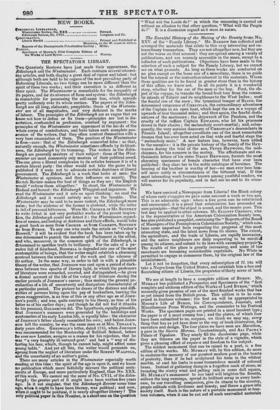THE SPECTATOR'S LIBRARY.
Two Quarterly Reviews have just made their appearance, the Edinburgh and the Westminster. Each contains several interesting articles, and both display a great deal of vigour and talent : but although both are held to be organs of the now prevailing party of Reforming Liberals, no two things can be more different than the spirit of these two works ; and their execution is as different as their spirit. The Westminster is remarkable for the inequality of its papers, and for its absence of form and system : the Edinburgh is remarkable for possessing the self-same hue, which spreads pretty uniformly over its whole surface. The papers of the Edinburgh are all long, elaborate, pamphlets: those of the Westminster are of all magnitudes, and very deficient in the marks of labour. The principles of the Edinburgh are so vague that we know not how to define or fix them—principles are lost in dissertation, confounded in profession, overlaid by argument : the principles of the Westminster are uppermost in the minds of the whole corps of contributors, and have taken such complete possession of the writers, that they often content themselves with a very bare enunciation of them. The position of the Westminster Is firm—sure : that of the Edinburgh somewhat false : so that, naturally enough, the Westminster sometimes offends by its bluntness, the Edinburgh by its trimming. The writers in the Edinburgh are generally masters of their subject : those of the Westiminster are most commonly only masters of their political creed. The one gives a liberal complexion to its articles because it is of a certain liberal party: the other would not take the pains to be published if it were not to advocate certain doctrines of liberal government. The Edinburgh is a work that looks at men: the Westminster at opinions, and their influence on society. The Scotch Review makes the best of things as they are : the English would "reform them altogether." In short, the Westminster is Radical and honest: the Edinburgh Whiggish and ingenious. We read the Westminster and it sets us upon thinking: we read the Edinburgh and it would entirely save us the trouble. The Westminster may be said to be more violent, the Edinburgh more calm ; but the violence of the former is abstract, while the latter is full of personal bitterness. Were Mr. CROKER or MT..SOUTHEY to write (what it not very probable) works of the purest inspiration, the Edinburgh could not detect it : the Westminster, regardless of names, and looking at doctrines and their effect, would take a good book as soon from CROKER as from Consarr, SOUTHEY as from BYRON. To any one who reads the article on " Croker's Boswell," it will be evident that the book has been taken up by one determined to punish the member of Parliament in the editor, and who, moreover, in the common spirit of the Edinburgh, is determined to sacrifice truth to brilliancy. For the sake of a paradox full of falsehood, Boswati. is degraded into one of the most contemptible of beings, that the writer might establish a charming Contrast between the excellence of the work and the vileness of its author. In the same way, in order to fall in with a plausible theory of the writer, that JOHNSON was cast upon a period of darkness between two epochs of literary light, in which the professors of literature were rewarded, courted, and distinguished,—he gives a dismal account of the life of the votary of literature during the earlier periods of JouNsoris career; thus making the general peculiarities of a life of uncertainty and dissipation characteristic of a particular period. The picture he draws of the distress and difficulties of persons living upon the pay of booksellers, barring the gross exaggeration, is as true of this or any other age as of JOHNSON'S youth ; and was, quite contrary to his theory, as true of his latter as of his earlier days ; and though he did not feel it (thanks to his pension), GOLDSMITH did. The hypothesis, equally plausible, that JOHNSON'S manners were generated by the hardships and contumelies of his early London life, is equally false : the character ofJomvsores father closely resembled his own; and before Jolirrsox left the country, he was the same man as at Mrs. THRALE'S, forty years after. GRESWOLD'S letter, dated 1735, when JOHNSON was recommended for the Mastership of Solihull School, before be ever saw London, assigns as a reason for his rejection, that he was "a very haughty ill-natured gent." and had a "way of distorting his face, which, though he cannot help, might affect some young !adds." And yet all this, the writer would persuade us, sprung from the neglect of literature under Sir ROBERT WALPOLE, and the uncertainty of an author's gains. There are many articles in the Westminster especially worth reading at this time : the spirit of the age is upon it, and we know no publication which more faithfully mirrors the political sentiments of Europe, and more particularly England, than No. XXX. of this work. We cannot say the same of No. CVII. of the Edinburgh; the greater part of it might have been written five years ago. In it not singular, that the Edinburgh Review some time ago, whea it onght to have been literary, was political; and now, when it ought to be political, it is nearly altogether literary? The only political paper in this Number, is a short one on the question "What will the Lords do ?" in which the reasoning is carried on without an allusion to that other question, "What will the People do ?" It is a discussion argued as it were in vacuo.


























 Previous page
Previous page